
We left off with some words about pseudo-food from a follower of Allen Carr, who followed Easyway or Easyweigh. Could it be possible that the demonstrable addictiveness of food could be explained not by the presence of evil ingredients but by a lack of useful nutrients?
In other words, what looks like compulsive overeating might be simple and natural hunger. In a process similar to panning for gold, an enormous amount of substances are taken in, which the body must sift through for the elusive particles of actual value.
According to Rose Shepherd, contributing writer for The Independent, Carr was brutally truthful about his own former deplorable habits. She quoted him in conversation:
I was shoving mouthfuls and mouthfuls of filth and poison into my body without the slightest thought. It went in one end, and hopefully, eventually, it came out the other… It’s about appreciating that your body isn’t a waste disposal unit…
Here is a Carr-ism from The Easy Way to Lose Weight that might raise questions:
All creatures have a Sensor designed to tell them what to eat and what not to eat. Using sight, smell, hearing, touch and taste, they can establish whether something is edible and whether it’s the type of food for them… We are designed to know our favorite foods through our Sensor.
But even if that used to be true, we don’t have it any more. Our senses have been perverted by chemicals; our brains have been rewired. Take sugar as an example. Babies are fed sugar water from Day One, as well as other concoctions, as Dr. Pretlow has written about.
And store-bought baby food, who knows what’s in that stuff? Whatever finely-tuned sensing apparatus a baby may be born with, how can it withstand the relentless onslaught of toxic chemicals?
We mentioned the paucity of solid science around the various Easyways. Several useful studies could be designed to demonstrate important things about the method. One might involve cross-addiction. How many of the people who successfully quit smoking take up eating instead? Or vice versa?
This is interesting because anecdotal reports suggest that the Easyway learning is easily transferable, and once the skills are learned, they are likely to be employed in more than one situation. Confirmation of this would be exciting.
Other questions
If an institution had a large amount of resources to expend, other facts would be helpful to know. In theory, the Carr books should not be as popular as they were in the past, because the received wisdom is that nobody reads anymore. Yet, the books continue to sell. It has been suggested, in other contexts, that the eye-to-brain connection of reading a book is very important, and that reading is like falling into a hypnotic state, which is why Carr’s repetitive style is so effective.
On the other hand, many people are exposed to Carr’s ideas by listening to audio recordings of the books. Which method soaks in more efficiently? Here is another area of inquiry: Many Carr enthusiasts go to the centers and take part in groups. Others pay for individual, one-on-one sessions with a facilitator. Do those groups succeed better in the long term, than the people who have just read or listened to a book?
It seems like research showed some years ago that personal attention is, in and of itself, a powerful factor for life improvement. Just to be conscious that some other human being knows what you are going through, and cares (even if it is an artificially constructed relationship based on payment), seems to make a measurable difference in outcomes.
The Allen Carr Facebook fan page has 39,000 Likes
The volunteer critics at Goodreads.com give radically mixed reviews to Easyway to Lose Weight. Carr’s first published work, The Easy Way to Stop Smoking, is one of the most widely read how-to books ever. Now, the how-to book has its own how-to website. There might even be, somewhere, a CliffsNotes version of the how-to website.
The social medium Reddit contains a nugget of information about using Carr’s method to curb overeating and facilitate weight loss. An individual who only read the quit-smoking book but applied its lessons to food lost 20 pounds and said, “It is the only thing that has worked for me.”
Someone else pointed out that “smoking is a zero thing and eating isn’t,” but went on to allow that the basic message is the same: Namely, that the person doesn’t really want to smoke or eat, and “the perceived benefits are really just the addiction talking.”
Your responses and feedback are welcome!
Source: “The man who saved smokers has turned his attention to the fat of the land,” Independent.co.uk, 01/11/97
Source: “Allen Carr’s Easyweigh to Lose Weight,” Goodreads.com
Source: “Anyone else having success with Allen Carr’s Easyway method?,” Reddit.com, 2017
Image by Amazon, Fair Use.

 FAQs and Media Requests:
FAQs and Media Requests: 











